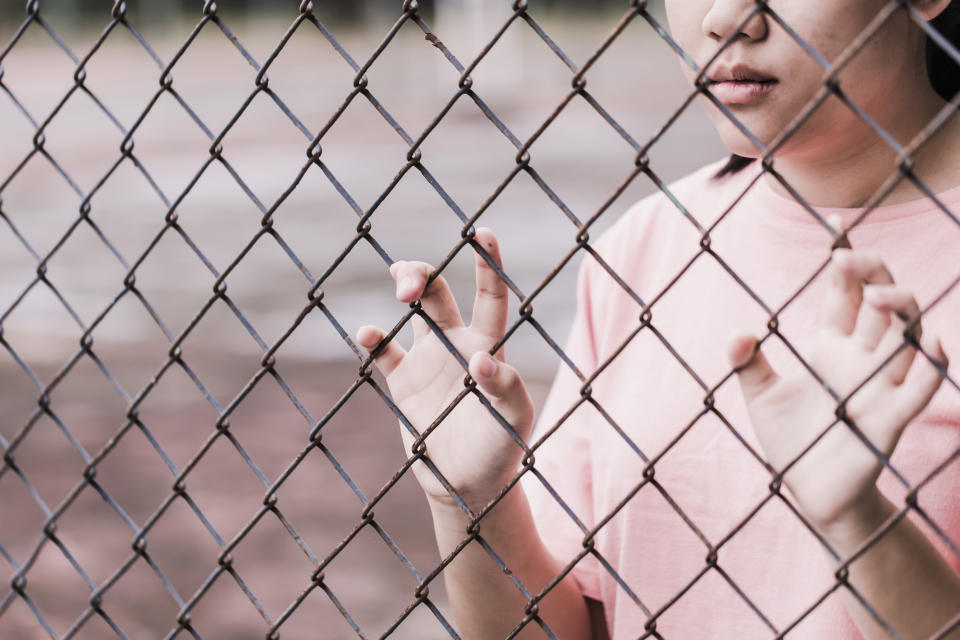Texas Governor Vetoes Bill That Would Help Sex Trafficking Victims Get Out Of Prison
Survivors of sex trafficking and domestic violence are devastated after Texas Governor Greg Abbott (R) vetoed a bill on Saturday that would have helped them receive clemency for crimes related to their exploitation, according to criminal justice advocates.
The bill was inspired by a 15-year-old girl who was sentenced to 20 years in prison for committing an aggravated robbery with her alleged pimp in 2016. It would have given a second chance to any survivor whose abuser had coerced them into committing a crime, or who assaulted their perpetrators to protect themselves from constant violence and manipulation.
The legislation would have been the first of its kind in the U.S. to impact sex trafficking survivors currently behind bars.
Elizabeth Henneke, the executive director at Lone Star Justice Alliance in Texas who advocated for the proposed legislation, spent the weekend telling the news to incarcerated survivors and their families, who thought the bill would become law since it had passed unanimously through the House and Senate on May 23.
“People are expressing devastation over this,” she said. “It’s an intense amount of dashed hope for the people inside [prison.]”
She read HuffPost one email from a victim’s stepmother who said she was heartbroken and afraid to tell the imprisoned survivor about the governor’s veto because “this might do her in.”
Henneke said one father of a domestic violence survivor wrote on his Facebook page that the bill would have given his daughter “a second chance at life.” “This hurts so much,” he wrote. “I don’t think the governor realized what he did to so many children.”

There’s no comprehensive national data on how many trafficking and domestic violence survivors are convicted on charges related to their abuse. But more than half of trafficking victims say they were arrested for crimes they committed as a direct result of being trafficked, according to a 2016 study by the National Survivor Network. A 2005 report from New York’s Department of Correctional Services also found that 67% of women imprisoned for murdering someone close to them had also been abused by the victim of their crime.
Henneke said there are few legal protections for survivors charged with crimes, and that they are often treated as offenders by police, lawyers and judges who lack the trauma-informed training to spot subtle signs of victimization.
The proposed bill would have changed the clemency process for imprisoned victims by establishing a panel of experts, including a survivor, advocate and social worker, to review inmate applications and advise the Texas Board of Pardon and Paroles on the cases.
It would have also done away with a requirement that survivors need two letters of support from either the sheriff, prosecuting attorney or judge in the county where the crime was committed. This can be a hurdle for many victims since these are the people who helped them get convicted in the first place.
In his veto statement, the governor characterized the panel of experts as an “extra layer of bureaucracy” and touted the fact that he recently signed two bills to help protect human trafficking victims.
His office did not respond to HuffPost’s request for comment.
But criminal reform advocates told HuffPost that expert input is essential, given that the board making clemency decisions consists primarily of law enforcement agents who might not understand the complexities of coercion and trauma bonding.
“Some people believe that for a case to be trafficking they have to see clear and irrefutable evidence of someone chained to a bed or someone severely beaten,” said Bradley Myles, the CEO of Polaris, an anti-trafficking nonprofit organization. “It’s a much more kind of complex tapestry of affection and other more subtle forms of control.”
Cathy Marston, who was incarcerated in 2004 for defending herself after being attacked by her abuser, said she and other survivors are rarely treated as victims by police and attorneys. Marston was released from prison in 2014 and has met many women this bill could have helped, adding that “disappointment doesn’t even begin to describe” how she feels about the governor’s veto.
“I just find it unconscionable that this is happening to women in this state in the first place,” said Marston, who is now the director of the advocacy group Free Battered Texas Women. “We are being victim-blamed by the very system that is supposed to be holding our batterers accountable and protecting us.”
Not many people receive clemency in Texas. In the fiscal year of 2018, only 12% of all applications involving non-capital punishment cases were considered by the Texas Board of Pardon and Paroles.
Henneke says she was taken by surprise that the bill didn’t pass since the governor’s office had not expressed any concerns with the proposed legislation or asked for any amendments. She’s worried what will happen to the many survivors who saw this proposed legislation as their only lifeline.
This week she’ll have to visit the teenager whose case inspired the bill and deliver the bad news.
“It is incredibly difficult to be in a position to raise the hopes of people who have long since let their hopes die,” she said. “I’m absolutely heartbroken.”
Love HuffPost? Become a founding member of HuffPost Plus today.
This article originally appeared on HuffPost.

